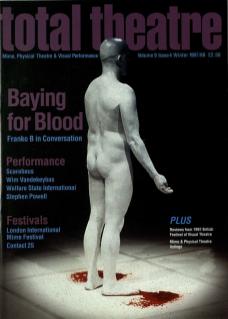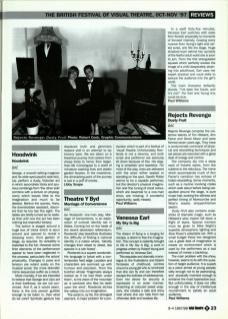George, a smooth-talking magician and his wide-eyed psychic sidekick, Lily, perform a dusty, Victorian act in which second-rate tricks and spurious ramblings from the other side combine with a lecture on physiognomy which leaves little to the imagination and much to be desired. Behind the scenes, Harry, the downtrodden assistant, discovers that he too has the sight. The tables are briefly turned as he realises that until now the act has been nothing but shameful trickery.
The action is staged around a huge box of tricks which is spun around and opened to reveal a dressing room, front garden or stage, as required. Its versatility is exploited to the full. However some finer elements of the performance appear to have been neglected in the process; particularly the actors’ physicality. Changes in pace and tension are reliant solely on the musical score; the more dramatic mime sequences suffer as a result.
More crucially, if we are intended to believe that George and Lily's act is their livelihood, we are not convinced. And if, as it would seem, Harry is the only person gullible enough to be taken in, then what do we care? Symbolic gesture has displaced truth and gimmicks replace skill in an attempt to lay trickery bare. We are taken on a theatrical journey that careers from cheap tricks to mime; from larger than-life monologues to a world of miniature washing lines and plastic garden flowers. In the meantime, the diminishing point of the journey is lost in a puff of smoke.

